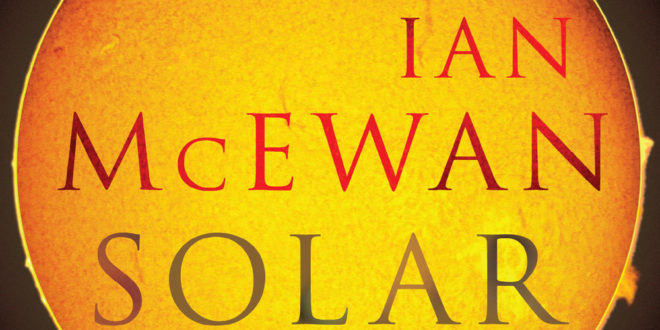Renewable energy has been a hot topic for a number of years now, but now more than ever, it’s something worth reading up on. Nothing demonstrated with greater clarity the connection between human activity and climate change than the visible effects of mass lockdowns globally on the environment during the pandemic of 2020. Smog-filled skies suddenly cleared over cities like Tokyo and Venetian canals returned to a brighter shade of blue, welcoming sea-life like never before. We know that we need to change our behavior as we return to normality, but how do we balance our businesses and international politics with doing the right thing for the future of our planet? Read on to find out where to read up.
‘Solar’, by Ian McEwan
In 2020 fewer carbon emissions worldwide as a result of the travel bans caused by coronavirus painted a startling obvious picture of the levels of pollution our activity as humans causes. This year we saw first hand the results of cleaning up our act, but go back to 2010 and one particular writer was lucky enough to be invited on an expedition to the North Pole along with a group of scientists by David Buckland’s Cape Farewell Programme to experience this without requiring the prompt of a global pandemic. This project revealed to the renowned author of Atonement, Ian McEwan just how significantly our behaviour effects the world’s fragile ecosystems, and bridged the gap between scientific exploration and research and the everyday realities of a normal citizen. McEwan’s novel, ‘Solar’, written in response to this expedition is a remarkable piece of fiction that really succeeds in bringing home the implications of our existence and ways of life in an understandable manner, bridging the gap between scientific writing and McEwan’s more readily consumable creative literature.
‘The Boy Who Harnessed The Wind’, by William Kamkwamba

Another beautifully written novel, William Kamkwamba’s ‘The Boy Who Harnessed The Wind’ will provide similarly captivating inspiration to the everyday person. Based on Kamkwamba’s own true life story, this Malawian masterpiece charts the progress of a young boy determined to help his village and indeed the world through capturing the power of the wind by making his own windmill. Now also available to watch in film format at Netflix, Kamkwamba’s story proves that even without basic resources anything is possible if we set our minds to it. As Ruth Harrison, a writer at Essay Services and Simplegrad reports of the novel, “Kwamba’s tale has shown just how life-changing pursuing renewable energy can be for the future of entire communities.”
‘Sustainable Energy: Without The Hot Air’, by David JC MacKay
It’s all very well feeling inspired to do better when it comes to climate change, but here is a book penned by member of the Department of Energy and Climate Change, David MacKay, that does the important job of communicating in simple terms exactly how we can go about actioning a plan. MacKay presents a series of six to seven potential solutions to the climate problem, outlining the exact paths we need to take to successfully make the UK 100 per cent renewably-run by 2050.
‘The Corporation’, by Joel Bakan
Turning an eye towards the responsibilities of businesses to begin doing the right thing with regards to our planet’s future, Bakan’s latest release examines the history of corporate structure in relation to their commitment to renewable energy. As climate journalist Michael Summers at Studydemic and Custom Writing Service comments, “this book provides a harsh critique of our shameless societal greed and the business norms backed by government legislation without consideration of morals.”
‘Too Big To Fail’, by Andrew Sorkin
Likewise, Andrew Sorkin’s ‘Too Big To Fail’ is an eye-opening analysis of the role big banks play in allowing concepts like renewable energy sources to take off globally. Sorkin examines the current relationship between sustainability and the global economy, highlighting the importance of persuading investment in renewable energy from big businesses so that we literally can not fail to achieve the environmental targets put in place.
‘The New Map: Energy, Climate And The Clash of Nations’, by Daniel Yergin
Lastly but by no means least, Daniel Yergin’s bold examination of the ever-changing geo-political map with regards to fueling the world is a gripping insight into the clashing of entire nations over energy sources. In it, Yergin looks at the newly emerging giants in the game of oil, territory, sustainable energy and of course, money.



